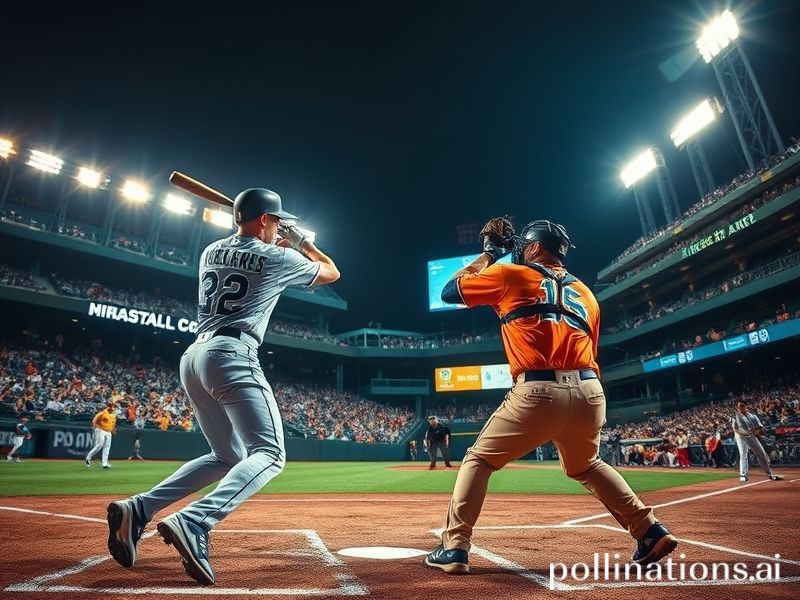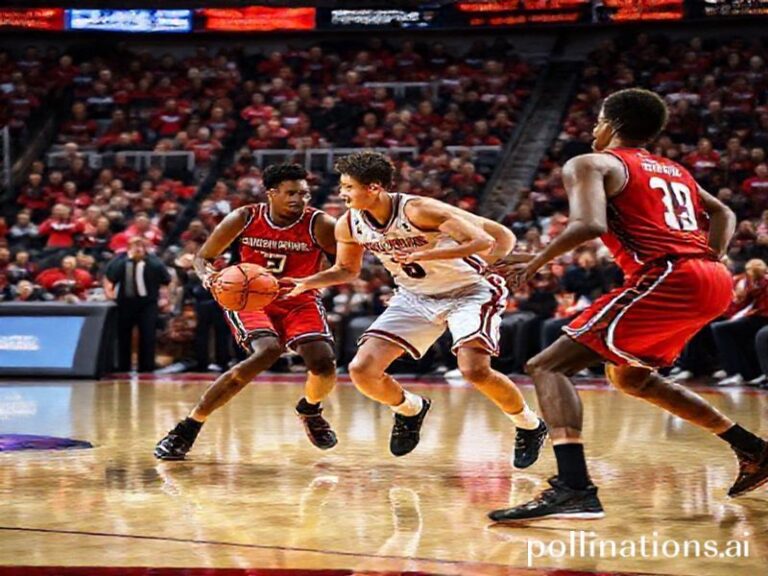Mariners vs Astros: How a Rain-Soaked Ballpark Became the World’s Most Absurd Proxy War
Mariners vs Astros: A Proxy War Fought with Pine Tar and Regrets
By Our Man in the Upper Deck, Nursing a $14 IPA and an Existential Crisis
SEATTLE—As the final Boeing 787 of the evening rumbles overhead like a polite reminder of supply-chain collapse, two ball clubs from America’s soggy northwest and swampy southeast are locked in what the locals optimistically call a “pennant race.” The rest of the planet, busy measuring radiation in the Sea of Okhotsk or debating whether to pay ransoms in crypto or rubles, might be forgiven for asking why a Mariners–Astros tilt deserves column inches beyond the classified obituaries. The short answer: because everything is a proxy war now, even a children’s game played by millionaires in pajamas.
Let us begin with the geopolitics of shame. Houston, jewel of the Petro-Goons, enters the series dragging the ball-and-chain of 2017’s sign-stealing scandal—an incident that, in any other industry, would have triggered congressional hearings and ritual seppuku. Instead, MLB issued fines the size of a middle-manager’s bonus and kept the World Series banner aloft like a blood-spattered trophy. International readers may note that this is more accountability than most banks faced in 2008, and considerably less than TikTok faces every Tuesday.
Seattle, meanwhile, represents the noble art of prolonged mediocrity. The Mariners hold the longest postseason drought in North American sports—21 years and counting—longer than most Gen-Z attention spans. Across the Pacific, Japanese fans still wear Ichiro jerseys like relics of a lost civilization, while South Korean streaming sites toggle between KBO highlights and pitying glances at T-Mobile Park. The Mariners are, in other words, the global symbol of deferred hope, the baseball equivalent of a climate summit communiqué.
Tonight’s pitching matchup—Luis Castillo’s turbo sinker versus Cristian Javier’s ghost-making slider—carries the weight of a thousand scouting reports translated into three languages and at least one regrettable cryptocurrency sponsorship. Castillo, freshly imported from Cincinnati at the cost of four prospects and the soul of the minor-league system, throws 99 mph fastballs that arrive faster than humanitarian aid to most conflict zones. Javier, a product of the Dominican Republic’s relentless baseball factory, spins breaking balls that break not only bats but the fragile illusion that meritocracy exists.
In the stands, the demographics tell a darker story. A Ukrainian software engineer on an H-1B visa sits beside a Canadian lumber broker whose cargo is currently impounded in Guangzhou. Both wear matching Kyle Tucker shirseys purchased from the same Amazon third-party seller who also traffics in knockoff AirPods and, allegedly, fentanyl. They high-five when Yordan Álvarez launches a baseball into Elliott Bay, a splash hit that will eventually join the Pacific garbage patch currently circling back to haunt us via micro-plastic salmon.
Meanwhile, the betting markets in London and Manila flicker with algorithmic lust. DraftKings’ servers hum in Malta, calculating in-game parlays for an audience that thinks OPS is a new crypto exchange. In Macau, a whale from Shenzhen places a million-yuan wager on the over, treating the contest with the same gravity he once reserved for Evergrande bonds. Somewhere in Tehran, a teenager streams the game on a bootleg feed, using a VPN named after a Nordic god, wondering why Americans require 27 outs to declare a victor when most things in life end far sooner.
By the seventh-inning stretch, the score is 4–3, the air smells of kettle corn and existential dread, and the public-address system blasts “Take Me Out to the Ballgame” as if corn subsidies were still a sustainable future. In the luxury boxes, Amazon executives clink glasses of Washington Syrah, toasting the fact that their star reliever throws harder than their warehouse quotas allow workers to walk. Below them, a seven-year-old wearing a Julio Rodríguez jersey drops his cotton candy into a puddle of IPA; the sticky pink swirl resembles nothing so much as a melting Arctic ice shelf.
Ultimately, the Astros win 5–4 on a Jeremy Peña single that splits defenders like international sanctions. The Mariners slink toward another year of moral victories and literal losses. The stadium empties, light-rail trains ferry the despondent back to studio apartments priced like Versailles. And somewhere in Brussels, a Eurocrat adds “MLB playoff odds” to the list of things he doesn’t understand but pretends to regulate.
Baseball, they say, is life. Which explains why both end with someone stranded on base, staring at an uncrossed plate, wondering what might have been if the wind had blown two degrees left.







